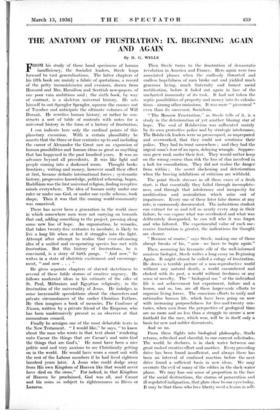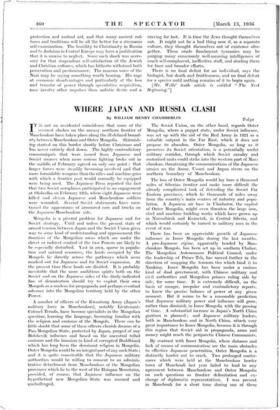THE ANATOMY OF FRUSTRATION : IX. BEGINNING AGAIN AND AGAIN
By H. G. WELLS
I can indicate here only the cardinal points of this planetary excursion. With a certain plausibility he asserts that the three or four centuries up to and including the career of Alexander the Great saw an expansion of human possibilities and human ideas as great as anything that has happened in the past hundred years. It was an advance beyond all precedents. It was like light and people coming into a darkened room. Thought broke frontiers ; writing and money, however small their effect at first, became definite international forces ; systematic history, progressive knowledge, political scheming, began. Buddhism was the first universal religion, finding receptive minds everywhere. The idea of human unity under one ruler or under one God, or under one cyclic scheme, took shape. Then it was that the coming world-community was conceived.
There has never been a generation in the world since in which somewhere men were not carrying on towards that end, adding something to the project, pressing along sonic new line of hope. An organisation, he remarks, that takes twenty-five centuries to incubate, is likely to live a long 'life when at last it struggles into the light. Attempt after attempt to realise that ever-advancing idea of a unified and co-operating species has met with frustration. But this history of frustrations, he is convinced, is a story of birth pangs. " And now," he writes in a state of obstetric excitement and encourage- ment, " and now . . . "
He gives separate chapters of shrewd sketchiness to several of these futile storms of creative urgency. He follows modernist ideas in his estimate of the rSles of St. Paul, Mithraism and Egyptian: religiosity, in the frustration of the universality of Jesus. He indulges in some inexcusable speculations about the characters and private circumstances of the earlier Christian Fathers. He then imagines a book of memoirs, The Coulisses of Nicaea, written by a private friend of the Emperor, who has been unobtrusively present as an observer at that momentous council.
Finally he arraigns one of the most debatable texts in the New Testament. " I would like," he says, " to know about the man who wrote in that text about ' rendering unto Caesar the things that are Caesar's and unto God the things that are God's.' He must have been a nice politic soul and very anxious to see Christianity getting on in the world. He would have worn a court suit with the rest of the Labour members if he had lived eighteen hundred years later. A Jesus who could dodge away from His own Kingdom of Heaven like that would never have died on the cross." For indeed, in that Kingdom of Heaven he proclaimed, God was all, and Caesar and his coins as subject to righteousness as Dives or Lazarus. Then Steele turns to the frustration of democratic revolution in America and France. Here again were two associated phases when the endlessly thwarted and endless hopefulness of men broke out and yielded much generous living, much fraternity and honest social rectification, before it faded out again in face of the uncharted immensity of its task. It had not taken the septic possibilities of property and money into its calcula- tions—among other omissions. It was more " piecemeal " even than its successor, SocialiSth.
" The Moscow Frustration," as Steele tells of it, is a study in the deterioration of yet another blazing star of hope. The soul of Bolshevism was suffocated mainly by its own protective police and by strategic intolerance. The Bolshevik leaders were so preoccupied, so unprepared and overworked, that they could not scrutinise their police. They had to trust somewhere ; and they had the _urgent man's fear of an open, delaying wrangle. Suppres- sion grew rank under their feet. They would rather keep on the wrong course than risk the loss of elan involved in a halt for consultation. They did not realise the danger from within ; the secret slackening and deterioration when the bracing inhibitions of criticism arc withheld.
The point Steele stresses in all these cases of a fresh start, is that essentially they failed through incomplete- ness, and through that intolerance and incapacity for modification and assimilation which arise out of impatience. Every one of these later false dawns at any rate, is enormously documented. The industrious student can extract for us and tell us nearly every step in their failure, he can expose what was overlooked and what was deliberately disregarded, he can tell who it was forgot and who faltered. The experimental value of each suc- cessive frustration is greater, the indications for thought are clearer.
" Because of course," says Steele, making one of those abrupt breaks of his, " now—we have to begin again."
Then; assuming his favourite r6le of the well-informed amateur biologist, Steele writes a long essay on Beginning Again. It might almost be called a eulogy of frustration. He draws a terrible picture of a non-reproductive world without any natural death, a world encumbered and choked with its past, a world without freshness or any sense of novelty. The ".biological use " of the individual life is not achievement but experiment, failure and a lesson, and so, too, are all these larger-scale efforts to organise living forces. The conscious efforts to unify and rationalise human life, which have been going on now with increasing purposefulness for five-and-twenty cen- turies, when seen from the perspective of geological time arc no more and no less than a struggle to secure a new foothold for the race, which won, will be in itself only a basis for new and nobler discontents.
And so on.
From these flights into biological philosophy, Steele returns, refreshed and cheerful, to our current solicitudes. The world, he declares, is in slack water between one great rush of creative effort and another. Every preceding drive has been found insufficient, and always there has been an interval of confused reaction before the next drive found a sufficient basis in new ideas. We may overrate the evil of many of the eddies in the slack-water phase. We may lose our sense of proportion in the face of the social destructions, the storms of persecution and ill-regulated indignation, that glare close to our eyes today. It may be that those who•love liberty need a lesson in self- protection and mutual aid, and that many ancient cul- tures and traditions will he all the better for a strenuous self-examination. The hostility to Christianity in Russia and to Judaism in Central Europe may have a justification that it is unwise to neglect. Some such shock was neces- sary for that stupendous self-satisfaction of the Jewish and Christian cultures, which has hitherto withstood both persecution and predominance. The raucous voice of the Nazi may be saying something worth hearing. His rage at economic disadvantages and particularly at the loss and transfer of power through speculative acquisition, may involve other impulses than sadistic desire and a craving for loot. It is time the Jews thought themselves out. It might not be a bad thing now if, as a separate culture, they thought themselves out of existence alto- gether. These crude flamboyant tyrannies may be purging many consciously well-meaning intelligences of much self-complacent, ineffective stuff, and steeling them for finer and broader efforts.
There is no final defeat for an individual, says the biologist, but death and fruitlessness, and no final defeat for a species until nothing remains of it to begin again.
[Mr. Wells' tenth article is entitled " The Next Beginning."]















































 Previous page
Previous page